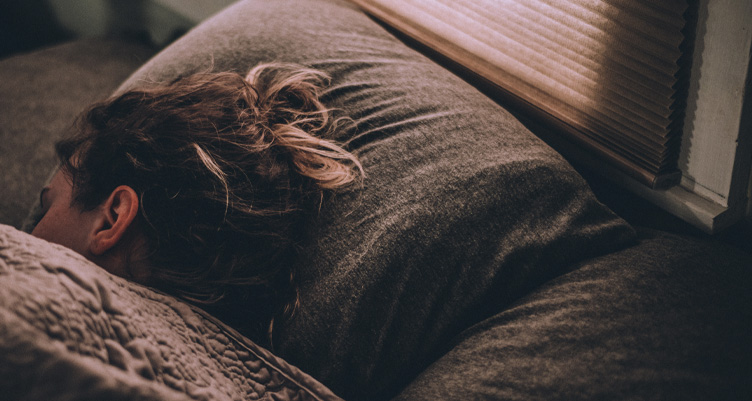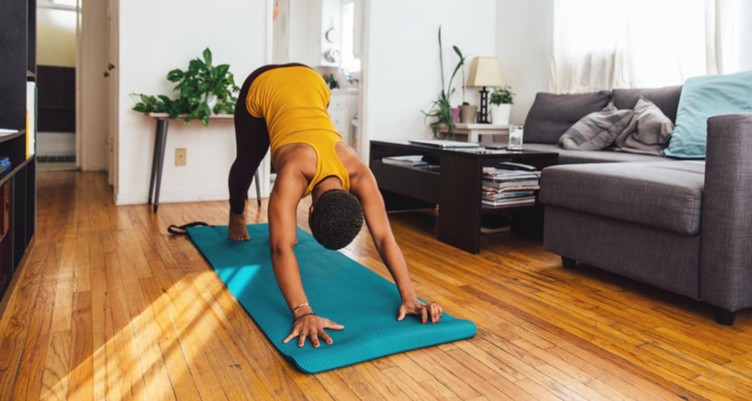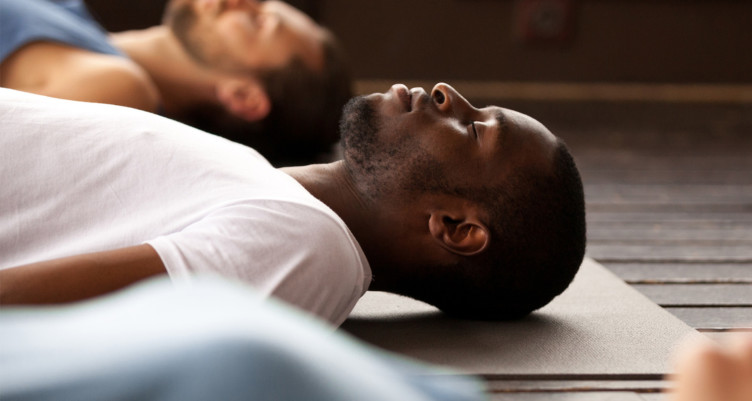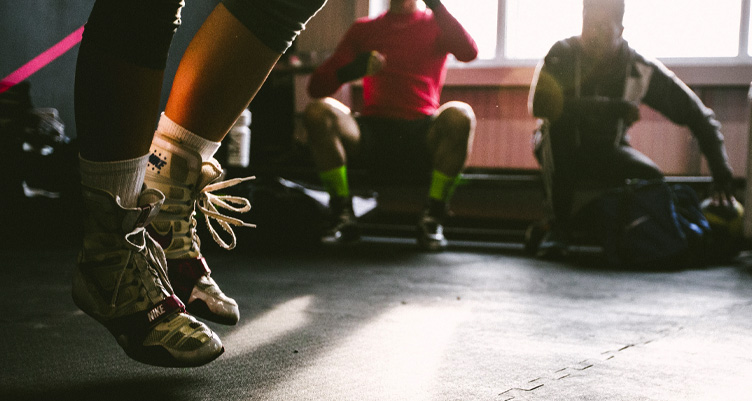How to Sleep Better and Manage Stress with Exercise

- Can’t sleep? Stress might be to blame. Stress keeps you in fight-or-flight mode, which makes you feel tense and anxious.
- Studies show exercise can help reduce stress, sleep better and improve overall wellness.
- You don’t have to hit the gym to reduce stress. Keep reading for tips you can start today to sleep better tonight.
You’re in bed, staring up at the ceiling and wondering why you can’t fall asleep. The reality is, there are a lot of valid reasons to be stressed right now. Stress can keep you up at night, leaving you feeling anxious and tense. What are ways to relieve stress so you can finally sleep?
Studies show exercise combats the effects of stress — specifically, the physical and neurological changes that put your body on edge. Those are the same physical mechanisms that keep your body from winding down and relaxing into a good night’s sleep. You don’t need a gym to get the benefits of exercise, either. Here’s how exercise can take the edge off stress and break a bad sleep cycle.
Why does stress affect sleep?

People tend to have a harder time sleeping when they’re stressed. Stress negatively affects the brain and nervous system. It keeps you in fight-or-flight mode — definitely not conducive to sleep.[1] And once stress starts affecting your sleep, it’s a self-perpetuating cycle of more stress and more sleeplessness.
Stress impacts your entire body thanks to elevated levels of cortisol, your body’s main stress hormone. Cortisol is a good thing in moderation. It helps your body prepare for action and wake up in the morning. But when this hormone is constantly present, it can cause communication problems between your body’s systems. This impacts everything from your muscles to your immune system:
- Muscle tension: Stress can make you tense. This constant state of muscle tension is a source of stress-induced headaches and lower back pain.[2]
- Inflammation and heart health: Long-term stress can trigger inflammation and cause difficulty breathing.[3] People with chronic stress also live with a constantly elevated heart rate and constricted blood circulation.
- Nervous system: The constant presence of stress can cause a breakdown in communication between the hypothalamic, pituitary and adrenal (HPA) axis. The breakdown of this system, result in your body being less resilient to stress due to a general weakening of your immune system.
Restore your zen with Bulletproof Zen Mode
How to reduce stress with exercise for better sleep
Studies show exercise strengthens the physical and neurological systems that help you beat stress, reducing the toll it takes on your body and brain.[4]
Reduces stress hormone levels

You can lower the amount of stress-induced cortisol circulating your body just by working out. Exercise has been proven to decrease cortisol levels in people with chronic-stress-induced depression.[5] In another study, people who performed daytime exercise showed suppressed cortisol levels at night.[6] Exercise also helps keep your hormones balanced, which means you’ll have an easier time getting to sleep.
Reduces muscle tension

Movement is the best way to reduce muscle tension. A good workout stretches your muscles, which can help reduce aches and pains related to muscular tension. The best part is that you don’t have to spend hours in the gym to feel better or crush a high-intensity workout every day.
- Yoga has been found to promote relaxation and produce a physiological state opposite to the fight-or-flight response.[7]
- One study showed that people who performed the Progressive Muscle Relaxation Technique (PMRT) significantly improved their sleep.[8] PMRT refers to the practice of progressively tensing and then relaxing the major muscles in your body.
Once your muscles aren’t tight and your body’s relaxed, you’ll be that much closer to falling asleep. To try it out for yourself, check out this guided yoga nidra routine.
Supports breathing and cardiovascular strength

Breathing deeply relaxes the lungs and body. The heavy breathing that comes with exercise strengthens the heart and lungs so they can better resist the lung constriction that can come from stress.
In one study, diaphragmatic breathing (deep breathing) was found to significantly reduce cortisol levels.[9] And with the clear lungs and a lower resting heart rate you get from exercise, you’ll be able to sleep easier.
Supports brain health

Exercise promotes the release of serotonin in the brain, the hormone that helps you sleep.[10] Exercise also affects the hippocampus — part of the brain’s limbic system which is responsible for emotion, motivation and memory, and is especially active during dreaming.
Even if you’re not stressed, studies show exercise helps you snooze better

Exercise relaxes your mind and levels your mood, “a cognitive process that is important for naturally transitioning to sleep,” says Charlene Gamaldo, M.D., in an article published by Johns Hopkins Medicine. “We have solid evidence that exercise does, in fact, help you fall asleep more quickly and improves sleep quality,” says Gamaldo. “Moderate aerobic exercise increases the amount of slow wave sleep, or deep sleep, where the brain and body have a chance to rejuvenate.”
A lack of exercise can actually cause sleep problems. For example, when surges at work cause you to put in more hours, work gets in the way of your exercise routine. Your lack of exercise can make your sleep worse, and lack of sleep may make you less active. It’s a vicious cycle.[11]
Instead, start a habit to get some daily movement. Exercise will help you sleep longer and better, and you might even see immediate results: Studies show that if you do a half-hour of exercise today, you can experience better sleep tonight.[12]
Relax and unwind with Bulletproof Sleep Mode
6 tips to improve your sleep with exercise

- Follow a routine: No matter what movement looks like for you, fit it into a designated part of your daily schedule. Start your day with a morning yoga session, take an afternoon walk and do a bodyweight circuit after work, or hit the weights after work and take a long walk after dinner. It all adds up.
- Get creative: Even if you can’t make it to the gym, you can find ways to exercise that help you feel good and unwind. Stretch, walk, run, hop on the stationary bike or do a bodyweight exercise routine.
- Take a yoga class: Stretching helps ease muscle tension and a nice savasana ends the practice with a meditative stillness that clears your mind, relieves stress and can either prepare you for sleep or help you get laser-focused on your day. Now is the perfect time to try an online class, whether you’re browsing on Youtube or trying a free class from CorePower Yoga.
- Don’t exercise too close to bedtime: It’s important to give your body time to recover before bedtime because the endorphins may keep you awake.
- Don’t overdo it: It’s okay to take it easy. One study showed that a half hour of low-intensity exercise lowered blood cortisol levels, but a super-hard workout actually raised them.[13] That’s because exercise is its own form of stress. You’re stressing your muscles (in a good way). If you’re sore or fatigued, dial back the intensity, try mobility movements or focus on meditative stretches for the day instead.
- Make it a routine: With repetition, your brain will be trained when bedtime is coming and you’ll have no problem falling asleep. If you work out in the evening, follow a regular routine: exercise, make dinner, shower and then unwind and get ready for bed.
Sign up for early access to sales, product launches, the latest Bulletproof news and more!



